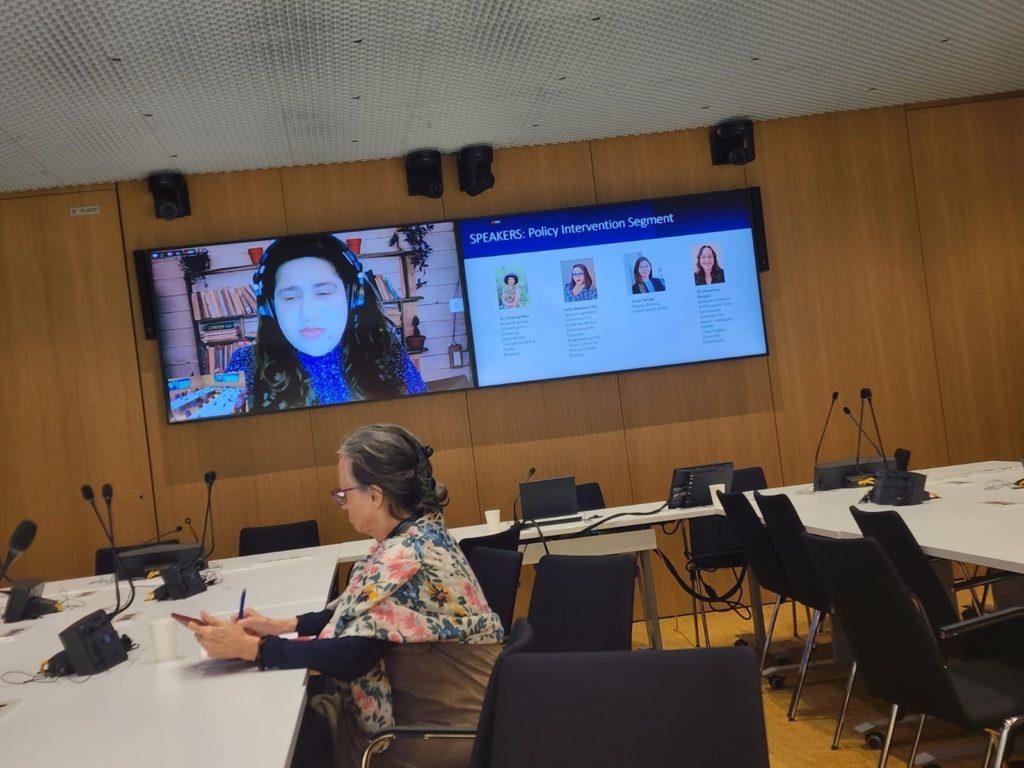
This week’s Fifth Global Forum on Human Resources for Health in Geneva concluded with a powerful message from Dr. Tedros, the Director General of the World Health Organization (WHO), reminding us that health and care workers deserve more than just thanks. “They deserve quality education and training, they deserve safe working conditions, they deserve decent pay, and they deserve respect. They deserve our every effort to protect, invest, together”, he concluded. A shortage of 10 million health workers is estimated by 2030, with Africa and Eastern Mediterranean accounting for almost two-thirds of this projected shortage. Dr. Tedros also highlighted the glaring gender discrimination in the health workforce that includes issues of the gender gaps in pay, and leadership, as well as the burden of unpaid care work and gender-based violence that is disproportionately borne by female health workers.
Evidence from the 2021 Global Health 50/50 report, Gender Equality: Flying Blind in the Time of Crisis, highlights that while 79% of global health organizations commit to gender equality, only 40% of the organizations define gender in their public communications, 31% of the organizations have a CEO that is a woman, and only 26% of the organizations have a board chair that is a woman. What this data tells us is that while many global health organizations and their leaders might have good intentions, they need to move towards building a culture of transformative change to strengthen leadership as well as promote gender equality within their organizations as well as the broader field of global health.
Enter our session.
Themed “Moving from intentions to transformative change: strengthening leadership and gender equality in global health and within health system”, the session advocated for adopting a gender transformative lens to strengthen leadership as well as to ensure we are adopting a gender lens to address the issues faced by health systems. The session brought together a diverse panel including a feminist full house of nine speakers (Sonja Tanaka, Johanna Riha, Rosemary Morgan, Faith Nekabari Nfii, Nelly Munyasia, Hamaiyal Sana, Susana Ku Carbonell, Reem Elsayed) to discuss gendered realities from the perspectives of health system policy leaders as well as the healthcare workers at the frontlines themselves. The key questions addressed by the session included:
The session aimed to strengthen an understanding among policymakers and implementers to practically design inclusive organizations at different levels of the healthcare system by presenting the latest key evidence on leadership traits and approaches as well as organizational practices needed to successfully champion gender equality in the health and care sector. The panelists included individuals from various organizations, such as GH5050, UNU-IIGH, John Hopkins, Africa CDC, Ministry of Health and Public Hygiene in Burkina Faso, RHNK, IFMSA, Ministry of Health in Egypt, and McMaster University. The session was also supported by the Global Health Workforce Network’s (GHWN) Gender Equity Hub.
The key takeaways from the session included the need for defining feminist and gender-transformative leadership, what it looks like, and what traits differentiate these leaders. The session also called for the power of the collective to advocate for different styles of leadership, regardless of gender, and the need to look beyond hierarchical and masculine notions of leadership.
Panelists highlighted the need for strengthening governance structures and building enabling environments as well as cultures that do not expect women to conform to masculine notions, or those from the global South to conform to cultures established by the global North. Having transparent data to measure progress as well as build mechanisms of accountability was emphasized, moving away from the notion of “illusion of inclusion” to working collectively and collaboratively to create gender-equal global health systems and organizations.
The session concluded with an emphasis on building strategic allyship, involving powerful men in the conversation, and pointing out that gender equality is not just a women’s problem to solve. Gender transformative leadership is needed to tackle power imbalances, regardless of the gender of the leader, moving away from the notion of a “business case” for gender equality towards developing global health systems and organizations with a justice and rights lens. Addressing gender disparities requires gender transformative leadership at all levels of the health system to design and implement interventions and foster institutional environments in which women and those with minority backgrounds can thrive.
The session built upon the 5th Global HRH forum’s theme of “protect, invest, together” to call for the urgent need to address gender inequality and transform leadership within the healthcare system to ensure that health workers are valued, supported, and respected. It is not just about having good intentions; it is about taking real actions that shift the distribution of power and opportunity toward a more just and equitable global health sector.
Finally, I had the opportunity to learn the ‘ins and outs’ of what it takes to be behind the scenes of a massive multilateral conference, a shout out to Michelle McIsaac and our EV celebrity Shakira Choonara at WHO for the support.